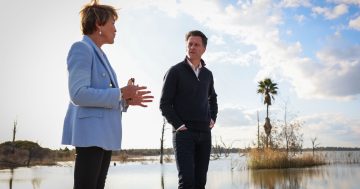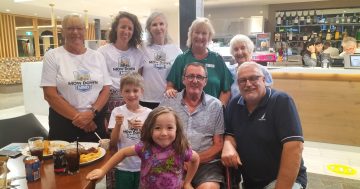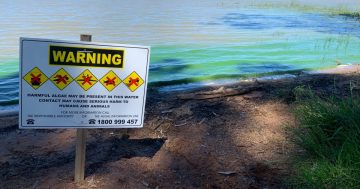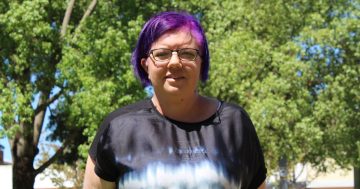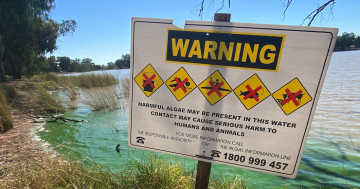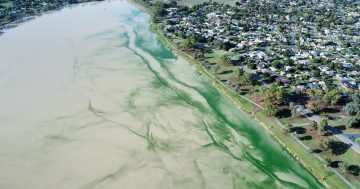
Professor Dominic Rowe and neurologist Martin Jude have begun researching the environmental links to MND in the region already following the research centre’s launch on Saturday (22 February). Photo: Supplied.
A new motor neurone disease (MND) surveillance centre in Wagga will seek to solve the mystery of shockingly high rates of the illness in the Riverina, including looking at whether blue-green algae in waterways could be a triggering factor.
MND is a serious illness that damages a person’s nervous system, weakening muscles such that a sufferer loses their ability to walk, speak, swallow and breathe, before they ultimately lose their life.
An initial study by Macquarie University in 2015 found the rate of MND in the Riverina was seven times higher than the national average.
The university’s new MND Surveillance Centre will look at the environmental impacts that may lead to the higher rates of the disease, including the region’s ongoing issues with its polluted lakes.
“MND can occur anywhere, but our observation is there are clusters far above the expected incidence and prevalence in areas around rivers and lakes, and as the heat map grows, we’re expecting it to reflect that,” says Macquarie University’s Dominic Rowe.
“All of this comes down to what we are doing to our environment.
“There are multiple potential triggers for this disease, but one of the big ones is agricultural chemicals.
“Nitrogen promotes algal blooms in the waterways, and many algal species, like blue-green algae and red algae, contain cyanobacteria that have also been linked to MND.
“And we are seeing hundreds and hundreds of these blooms around the state and around the country every summer.”
Overseas studies suggest exposure to a toxic bacteria known as blue-green algae in waterways over a long period could be a triggering factor linked to high MND rates. Frequent algal blooms in Wagga’s Lake Albert and Griffith’s Lake Wyangan has led to speculation that this may be a cause, but a link has not been conclusively proven.
Professor Rowe AM has been treating patients with MND for 27 years, and leading the multidisciplinary MQ Health MND Clinic in Sydney’s north for the past 15 years.
MND has increased as a cause of death in Australia by 250 per cent over the past 30 years.
While in Wagga Wagga, Professor Rowe will lay the groundwork to establish contact with MND patients in the region and also to raise awareness among clinicians.
“It’s important for people to know there is an increased rate of MND in the area and to be on the lookout for early symptoms of the disease, like weakness in the arms and/or legs and slurred speech, because they can easily be mistaken for other conditions,” he said.
“I currently have 16 patients in the Riverina, and I’m sure there are more people in the area who we don’t know about.
“This is already above the percentage you would normally expect to see in a population of 160,000.”
Member for Murray Helen Dalton said the people of her electorate were fearful of the sharp rise in MND in the region and she hoped the research would help alleviate some of that stress.
“The people in my electorate have been deeply concerned about this crisis for more than a decade,” she said.
“With this continued funding for research, hopefully we are another step closer to treatment and a cure.
“Rates of motor neuron disease are up to seven times higher around Lake Wyangan, located near Griffith, than in other areas of Australia and this allocation of funds is great news for communities in the Riverina.”









